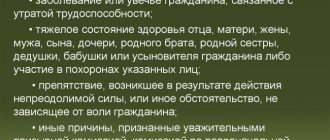Responsibility for giving a bribe
Responsibility for giving a bribe
Giving a bribe is prohibited by the Criminal Code of the Russian Federation and liability for this act is prescribed in Art. 291 of the Criminal Code of the Russian Federation. In this case, liability occurs regardless of the method of transferring the bribe - it can be either personal contact with the bribe recipient or the transfer of illegal remuneration through third parties (intermediaries).
✔Responsibility and punishment for giving a bribe.
According to the sanctions of Part 1 of Art. 291 of the Criminal Code of the Russian Federation, a simple bribe that does not have signs of significance or large size is punishable by a fine of 15 to 30 times the amount of the bribe or a prison term of up to 2 years with a simultaneous fine of no more than 10 times the amount of illegal remuneration. The sanctions for qualified types of this crime are presented in more detail in the table below:
Established in Part 3, the deliberate illegality of the actions for which a bribe is given implies that the bribe-giver understands and is aware of the illegality of the behavior that he demands from an official: a police officer, a doctor, a teacher, a government employee. institutions, etc.
Example 1: Citizen A., when visiting a doctor, asked to expedite his admission as a patient, supporting his request with a 1000-ruble bill. This act will be qualified under Part 1 of Art. 291 of the Criminal Code of the Russian Federation - that is, a “simple” bribe.
Example 2: Citizen B., having been stopped by a traffic police inspector for not fastening his seat belt and lack of MTPL insurance, offered the inspector for 1000 rubles “not to notice” these traffic violations and not to draw up a report. This act will be classified under Part 3 of Art. 291 of the Criminal Code of the Russian Federation – i.e. giving a bribe for obviously illegal actions of an official.
Example 3: Citizen Z. appealed to the head of the department of the military commissariat with a request to assist him in evading military service and offered to give him a deferment on grounds that did not actually exist. In exchange for assistance, the citizen offered 160,000 rubles. The act will be qualified under Part 4 of Art. 291 of the Criminal Code of the Russian Federation, since here there is a large amount of bribe and its giving for a knowingly illegal action of a military registration and enlistment office employee.
✔ How to avoid responsibility?
The footnote to the article under discussion states that the bribe-giver is exempt from liability if he meets one of the following conditions:
— Voluntarily reported giving a bribe to the police.
— Active assistance was provided in solving the crime.
— The official who received the bribe was extorting it and himself offered to commit this act.
Is it possible to avoid responsibility?
If a person voluntarily contacts law enforcement agencies, passing on information about a planned transaction, then he can count on being released from liability or having a reduced sentence. By the way, if you were provoked to give a bribe, then in this case you cannot talk about criminal prosecution. In such situations, if you cooperate with the investigative authorities, the FSB - all responsibility falls on the recipient of the bribe, and you remain a witness. But we always approach “plea deals” with caution, because there are many nuances in such a process, the main one of which is the actual admission of guilt, which is not always appropriate and permissible.
There are actually many options for avoiding liability, including competent testimony from all participants in the case, and the lack of evidence in the form of correspondence, video or audio recordings, printouts of phone wiretapping, etc. It is important to choose the right, most beneficial position for you and stick to it. We do not recommend radically changing the testimony during the course of the case; this is perceived negatively by the court, therefore, it is better to decide on the position on the case at the very beginning, after it has been developed with a lawyer who is a specialist in bribery cases.
As you can see, the penalties for bribes are quite severe. Therefore, before committing any such actions of giving or receiving a bribe, you need to objectively assess the situation and refuse such actions.
Attention! If in any case it is better to contact qualified bribery lawyers who can answer your questions and solve the problem
What to do?
The defense to a bribery charge may vary:
- If there is no clear evidence of a bribe, then it is necessary to prove that the relationship between the parties to the crime was formed on a legal basis. It's even better to prove that they didn't know each other at all.
- Evidence of provocation on the part of law enforcement agencies. If it can be proven that the bribe was staged by the authorities, the court will release the accused from liability. In addition, provocateurs may themselves be put on trial under Art. 304 CC.
- If evidence of a crime is presented to the court, then you can try to find procedural violations during the investigation. For example, conducting illegal covert filming, wiretapping or searches. The presence of such violations may help the defense of the accused.
- If there is indisputable evidence of giving and receiving bribes, an experienced lawyer can reduce the liability of the accused. In this case, the repentance of the accused, his desire to help in the investigation, and the fact that he committed such a crime for the first time may play a role. All this can help reduce the term of imprisonment or, instead of imprisonment, give the opportunity to pay a fine.
Example. The Buryatia court considered the issue of giving a bribe to a citizen. B. During the trial, it was found out that B. was forced to give a bribe of 15,000 rubles. employee of the department for combating tax crimes G.
G., in the process of carrying out operational investigative measures, promised to issue a fine of 200 thousand rubles. or close the store owned by B. if she does not pay the money. For copying the report on the condition of the store, he demanded a bribe, the amount of which he printed on a calculator. The woman collected the money and handed it to G. in his office. That is, the operational-search activity ended in G.’s office, where B., as a result of provocation on the part of G., gave him 15,000 rubles.
These actions were qualified by the investigation as giving a bribe (Article 290, Part 2). The court regarded this broadcast as an indirect provocation and acquitted B.
Can I pay the fine to the inspector on the spot?
Yes, but only in strictly defined cases.
First , you must make sure that the traffic police inspector issued a decision on the offense and gave you a copy of it. There is no need to pay a fine based on the completed protocol - this is not a resolution with a receipt, but just a document about the initiation of an administrative case.
Secondly , the traffic inspector must have a terminal with him to accept payments for traffic police fines - similar to the terminal in a store. This device should issue receipts indicating successful payment of the fine. Moreover, there must be two such receipts - the traffic inspector attaches one to the issued order, and the second must be given to the driver.
Thirdly , paying a traffic police fine on the road through the terminal is only possible in a non-cash manner - using a bank card. If IDPS offers you to pay him in cash, without checks, do not agree. After all, in this case, you will not have any evidence that you paid the fine and did not improve the financial condition of the traffic police officer.
So, paying a fine in cash is considered a bribe. If the inspector has a payment terminal, you can pay through the device, but be sure to take a receipt.
Are there penalties for intermediaries?
Yes, the intermediary in receiving a bribe is the same criminal.
The intermediary acts as a link between the one who gives the bribe and the one who takes it. For example, this could be a person who is looking for the right official so that with his help the student can pass the exam at the MREO traffic police. When imposing punishment, it is not so important on whose side the mediator worked. The fact of his illegal actions is much more important. Mediation in bribery is punishable under Art. 291.1 of the Criminal Code of the Russian Federation. Penalties also depend on the size of the bribe.
We invite you to study this article yourself - and we will only list the maximum penalties for intermediaries for their participation in corruption schemes:
- fine – 3 million rubles,
- prohibition to engage in certain activities and hold certain positions – 7 years,
- prison - 12 years.
Usually, dishonest traffic police officers act through intermediaries. In order not to expose themselves, they offer drivers to transfer money through a trusted person. After the intermediary receives cash or money on the card, he transfers it to traffic police inspectors. And such “helpers” are subject to criminal sanctions.
For example, in Primorye, a whole group of bribe takers was arrested in the person of the head of the MREO and his subordinates. They received bribes from future drivers in exchange for successfully passing driving tests.
But how do they find out about the transfer of a bribe?
Crimes in the field of bribery become known from the participants in the “deal” themselves, or as a result of investigative and operational activities.
How do operatives find out about the fact of giving or receiving a bribe:
- From CCTV cameras installed in the interiors of patrol cars, the camera records not only what is happening outside, but also what is happening inside the cabin. And the fact of offering a bribe to a traffic police officer is instantly caught on camera - and this is significant evidence of the driver’s guilt.
- From recordings from cameras on the clothes of traffic police inspectors.
- Based on the report of a traffic police officer - if he was faced with a proposal to hush up the case from one of the drivers.
- From motorists and their relatives, from whom officials demanded money in exchange for certain actions or inactions.
- From drivers who paid a bribe but later confessed to the crime.
- From any other witnesses to what happened.
In 2021, the situation with bribes is much better than in the 90s. The credit for this lies in the policy of control over the work of police officers by the Department of Internal Security (USB). The risk of being caught in the act of taking a bribe and receiving a real sentence increasingly influences the consciousness of law enforcement officers.
Assigning liability for attempted bribery to an official
Preparation and attempt to commit a crime is subject to consideration under Articles 29 and 30 of the Criminal Code of the Russian Federation. These acts in the case of giving a bribe intended for an official include collecting money or valuables (for bribery), searching for a method of transfer and persons providing assistance, scheduling a meeting - in general, all deliberate actions that ensured the commission of the illegal act in full .
It should be noted that Art. 29 provides for the application of criminal liability to a person as for a crime committed under Art. 291, but with reference to Article 30 of the Criminal Code, which, in turn, notes the possibility of such punishment only for preparation for a serious and especially serious crime. In other cases, sanctions against the accused person are not applied in full, but provide for partial application of the responsibility provided for the crime committed.
Important! Liability depends on how the bribe is recognized (in a significant amount, large and especially large), as well as on whether the crime was committed by a group (which is an aggravating circumstance) or concerned one person.
Bribe concept
Before considering an encroachment on a bribe, you need to decide on bribery itself and how the law defines it. According to the Criminal Code (CC), a bribe is the bribery of an official. Bribery is committed so that an official, taking advantage of his position, performs certain actions in the interests of the bribe-giver. However, an official does not have to do anything; sometimes his inaction is enough.
The bribe itself can be:
- explicit, when the transfer of funds occurs from hand to hand;
- veiled, when material assets in the form of various goods and services are offered as a bribe, free of charge or at reduced prices.
A bribe is a transaction in which two parties are involved. At the same time, both sides do not always want this “deal” equally. That is why the Criminal Code contains two articles provided for the initiator of illegal actions:
- under Article 290 of the Criminal Code of the Russian Federation, the recipient of illegal remuneration, that is, an official, is responsible;
- According to Article 291 of the Criminal Code of the Russian Federation, the guilt of the bribe-giver is determined.
One way or another, both will be held accountable to the law, but it is the initiator who usually receives a more severe punishment.
Gift, bribe, attempt - crimes
But all that glitters is not a bribe. The law does not prohibit making gifts to officials and civil servants. But with one significant amendment, or rather limitation. According to Article 575 of the Civil Code, an official can accept gifts if their value does not exceed three thousand rubles.
At the same time, gifts should not be in any way connected with the performance of any actions (inaction) in the interests of the donor. Otherwise, the crime of bribery will be evident, and the amount spent on the donation will not matter.
Reference. The articles on bribery do not establish a minimum amount of funds or material assets at which a criminal case is initiated.
If we talk about the differences between an attempt and a committed crime from a legal point of view, then an attempt to take a bribe does not constitute a crime. According to Art. 290 and 291, the objective side of bribery is the transfer or receipt of remuneration.
For qualification purposes, it does not matter what amount was transferred (only part of the funds may be transferred), the court will be interested in the “final” amount that was discussed by the parties .
The subjective side of an attempt remains the same as that of a committed crime - this is direct intent. The bribe-taker, an official, is well aware that he is receiving a bribe for certain actions (inaction) in his service in the interests of the bribe-giver.
The bribe giver, in turn, is also well aware that he is committing an illegal act by giving money in exchange for “preferences.” And one way or another, both sides have the only motive - self-interest.
The difference between a bribe and commercial bribery is here.
A traffic police officer demands a bribe from me - what should I do?
Now let's look at what to do if traffic inspectors carefully or in a demanding manner want to take a bribe from you (no matter what):
- First of all, ask the IDPS to introduce themselves. Copy the data from his ID or badge, and if you don’t have a pen with you, read the inspector’s personal data out loud (for the second point).
- Turn on the camera on your phone or turn the recorder so that it records your communication with the traffic police officer. It would be a good idea to turn on the voice recorder. Warn the inspector that you intend to film - for many IDPS, this is like garlic for a vampire, and at least they will not risk demanding money from you for the camera.
- Stay in your car and do not approach the patrol car. You, as a driver, do not have such an obligation - only if administrative detention and delivery to the police station are not applied to you.
- Call the helpline number and report that the traffic police inspector is extorting a bribe from you. Tell the operator where you are, the details of the police officers, as well as the evidence you have collected (if any). The toll-free telephone number of the Russian Ministry of Internal Affairs hotline is 8-800-222-74-47, the Russian Ministry of Internal Affairs hotline is 8 (495) 667-74-47). After the police arrive at the scene, let them know that you are ready to write a statement about extorting a bribe.
Also, do not tell the traffic police inspector who stopped you about your place of work. Often, with such questions, officials establish who is in front of them and how much they can cheat you out of. As a last resort, say that you work as a “legal assistant.” As a rule, inspectors will immediately lose interest in you and stop talking about bribes.
In general, try to behave naturally, communicate in a correct manner, and do not resort to threats and anger. Many traffic police officers are psychologists of sorts. Their goal is to frighten the driver, confuse him, and put him in a hopeless and stressful situation. Your goal is not to fall for their tricks and under no circumstances agree to give a bribe!








